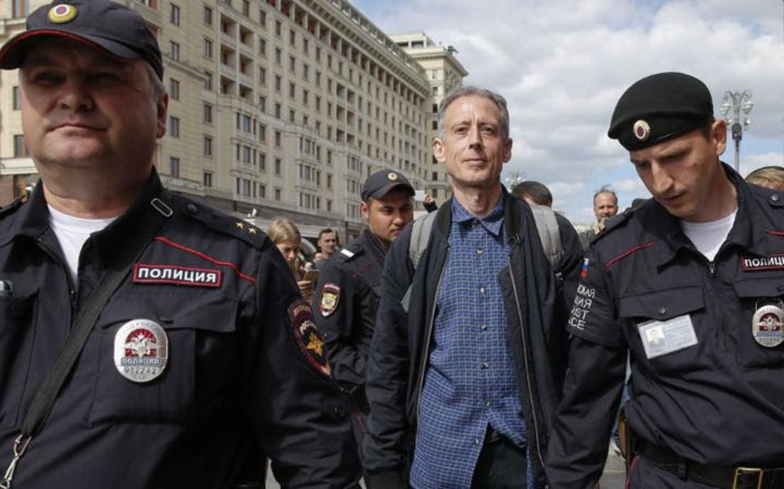
Peter Tatchell has been arrested in Moscow after staging a one-man protest for Chechnya’s treatment of LGBTQ people.
The LGBTQ activist sported a banner in support of gay men who have been victim of the Russian republic’s anti-gay purge – which has reportedly taken the lives of over 27 men.
Last month, Russia claimed to have found no evidence of LGBTQ in Chechnya, with their Justice Minister telling reporters: “The investigations that we carried out did not confirm evidence of rights’ violations, nor were we even able to find representatives of the LGBT community in Chechnya.”
In front of the statue of Marshal Zhukov close to the Kremlin, Tatchell held a banner which read: “Putin fails to act against Chechnya torture of gay people.” Shortly after, several police officers apprehended him.
He has now been released on bail, and is due in court on 26 June.
Kate Allen, Amnesty International UK’s Director, said: “The response to Peter Tatchell’s protest is straight out of the Russian authorities’ playbook – protest in a high-profile location like Red Square, hold a placard criticising Putin or speak in support of LGBTI right in public, and face immediate arrest by the police.
Related: Gay men taken by authorities in Chechnya have ‘never been found’.
“In present-day Russia, there’s not right to peacefully protest, no right to publicly stand up for LGBTI people, and certainly no chance of staging a street protest about last year’s sinister gay crackdown in Chechnya.
“It’s no surprise to hear that Mr Tatchell has been arrested solely for exercising his right to peaceful protest. We understand he has now been released but will stand trial for this ‘offence’. This is outrageous – all charges against him should be dropped immediately.
“Peter Tatchell’s arrest should not distract attention from his message. The Russian authorities should explain what steps have been taken in earnest to investigate reports of a ‘gay purge’ in the Chechen Republic.”
Before the protest, Tatchell said: “I was exercising my lawful right to protest, under the Russian constitution, which guarantees freedom of expression and the right to protest in Articles 29 and 31. A one-person protest, which is what I did, requires no permission from the authorities and the police.
“Getting arrested is standard for Russians who protest for LGBT+ rights or against corruption, economic injustice and Russia’s annexation of Crimea and its bombing of civilians in Syria.
“Unlike brave Russian protesters, I have the ‘protection’ of a British passport, which means I have been treated more leniently than they are. My fate was mild compared to what often happens to Russians who dare to challenge the Putin regime. I am awed by their courage.”
He then slammed President Putin for failing to condemn the purge in Chechnya, and mentioned the disappearance of popular gay singer Zelim Bakaev, who went missing back in 2017.
Tatchell continued: “Russia’s 2013 anti-gay law against so-called ‘homosexual propaganda’ has been used to suppress peaceful LGBT+ protests, sack LGBT+ teachers and suppress welfare organisations that support LGBT+ teenagers.
Related: Voices4 stage protest in NYC demanding action over queer purge in Chechnya.
“Little action has been taken by the Russian government and police to crack down on far right extremists who target LGBT+ people for violent and humiliating assaults – including the instigators of the current threats to bash and stab LGBT+ football fans at the World Cup.”
Earlier this week, a gay football fan was left with serious brain injuries after being viciously attacked in Russia.
The 2018 World Cup has caused much concern for LGBTQ fans visiting Russia, with the Foreign Office, police and MPs claiming they are at serious risk of homophobic, racist and anti-British attacks.
In a statement, the UK Government warned fans: “There is no reason not to come to the World Cup if you are LGBT+.
“However, although same-sex sexual activity has been decriminalised in Russia since 1993, it is strongly understood and advised that you do not publicly display your sexuality, but this is up to the individual.”
Related: A year after the anti-gay purge, here’s what you can do to help.




